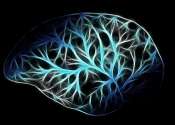Repairing nerves requires prods of protein
When there's damage in the body, our cells call for help. UConn brain researchers just found a new way cells do this—like in the old AT&T ad campaign, they reach out and touch someone.
May 5, 2021
0
51
When there's damage in the body, our cells call for help. UConn brain researchers just found a new way cells do this—like in the old AT&T ad campaign, they reach out and touch someone.
May 5, 2021
0
51

A team of researchers from Carver College of Medicine, the University of Iowa and the University of California, San Francisco, has found that doctors looking to make predictions about the degree of cognitive impairment in ...

Violent blows or jolts to the head can cause traumatic brain injury (TBI), and there are currently about five million people in the U.S. living with some form of chronic impairment after suffering a TBI. Even in a mild form, ...
Apr 13, 2021
0
105

The plasticisers contained in many everyday objects can impair important brain functions in humans. Biologists from the University of Bayreuth warn of this danger in an article in Communications Biology. Their study shows ...
Apr 12, 2021
1
128

In addition to smoothing out wrinkles, researchers have found that the drug Botox can reveal the inner workings of the brain. A new study used it to show that feedback from individual nerve cells controls the release of dopamine, ...
Apr 6, 2021
0
408

Scientists at the University of Cambridge have shown in animal studies that gene therapy may help repair some of the damage caused in chronic neurodegenerative conditions such as glaucoma and dementia. Their approach demonstrates ...
Mar 31, 2021
0
81

Men and women are impacted differently by brain diseases, like Alzheimer's disease and Parkinson's disease. Researchers are urging their colleagues to remember those differences when researching treatments and cures.
Mar 16, 2021
1
68

UT Southwestern scientists have identified key genes involved in brain waves that are pivotal for encoding memories. The findings, published online this week in Nature Neuroscience, could eventually be used to develop novel ...
Mar 10, 2021
0
137

Grafting neurons grown from monkeys' own cells into their brains relieved the debilitating movement and depression symptoms associated with Parkinson's disease, researchers at the University of Wisconsin-Madison reported ...
Mar 1, 2021
0
493

Human brains have an average of 86 billion neurons. These nerve cells are interconnected at junctions known as synapses, and some neurons have as many as 10,000 such synapses. A key to understanding brain function is to have ...
Feb 25, 2021
0
304
